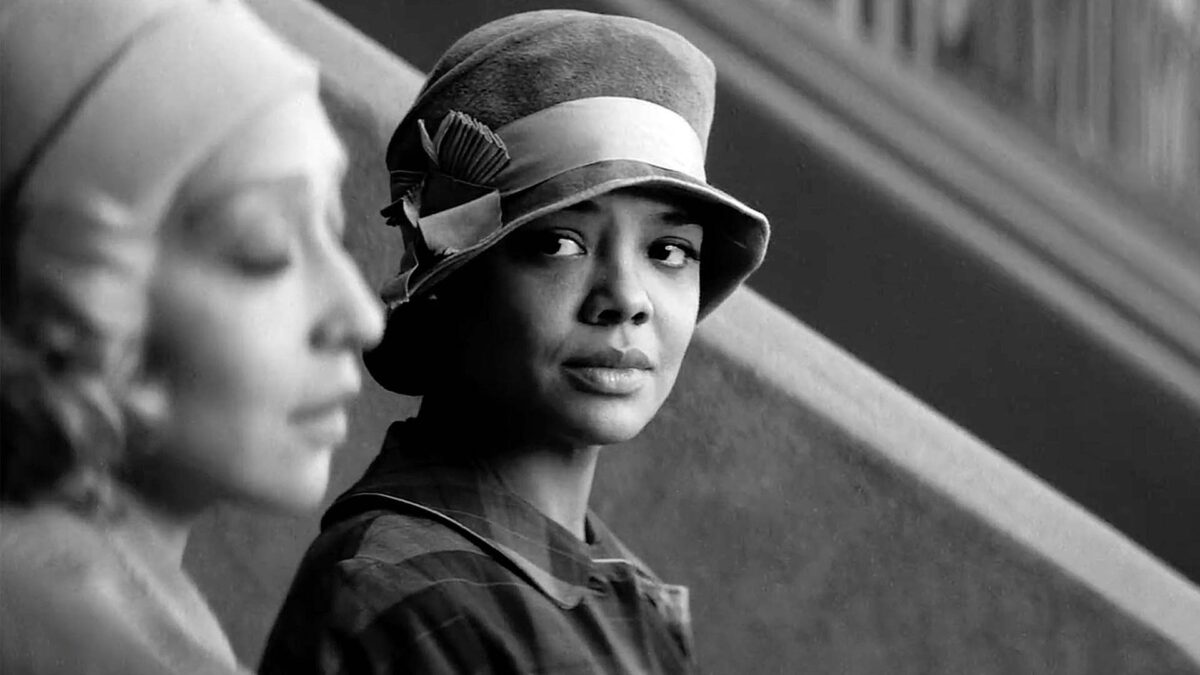
Rebecca Hall’s brilliant directorial debut “Passing” is the first film adapted from Nella Larsen’s groundbreaking novel of 1929 and is currently available on Netflix. Ostensibly about passing for “white” racially, both novel and film delve into issues of identity, sexuality, and repression: passing to accommodate societal norms and expectations.
Irene Redfield’s (Tessa Thompson) carefully constructed life as a doctor’s wife and mother of two sons in Harlem gets increasingly wobbly once she encounters childhood friend Clare Kendry (Ruth Negga), who is passing for white. Married to a racist, Clare is cut off from the Black experience, and over time it becomes clear that she longs for a return to authenticity. Meanwhile, Irene’s longing becomes evident as well; despite her ambivalence toward her friend, she cannot seem to break away from her. Her reactions to Clare’s gaze, her touches, and her kisses speak volumes wordlessly. Flirtatious sexuality is at the essence of Clare’s being, and one can only guess at what Irene is thinking and feeling in their scenes together.
 Larsen dedicated her book to Carl Van Vechten, a fellow traveler in the Harlem Renaissance who is represented by the “Mr. Wentworth” character. Van Vechten, despite having married two women, was known to have had sexual relationships with men. Irene hints at her friend’s true sexuality, and perhaps her own, in her conversation with him about what passing means: “We’re all passing for something, aren’t we?” Indeed, many of the central figures of the Harlem Renaissance were queer, though usually closeted. Harlem also had a flourishing gay club scene in this era, with both drag balls and drag kings, like blues singer Gladys Bentley.
Larsen dedicated her book to Carl Van Vechten, a fellow traveler in the Harlem Renaissance who is represented by the “Mr. Wentworth” character. Van Vechten, despite having married two women, was known to have had sexual relationships with men. Irene hints at her friend’s true sexuality, and perhaps her own, in her conversation with him about what passing means: “We’re all passing for something, aren’t we?” Indeed, many of the central figures of the Harlem Renaissance were queer, though usually closeted. Harlem also had a flourishing gay club scene in this era, with both drag balls and drag kings, like blues singer Gladys Bentley.
Hall insisted on shooting in black and white, not as a gimmick, but as a metaphorical device, and her choice is intrinsic to the film’s artistic success. The result is a sumptuous feast, eye candy that includes the wardrobes, settings, and most definitely the actors. The brilliant, expressive performances by Ruth Negga and Tessa Thompson set the screen crackling with eroticism, and never more so than when each turns her gaze upon the other.
The film starts slowly, with scenes that fade to white at their transitions, but it picks up and becomes vibrantly alive when the location shifts to venues of Harlem nightlife. A lovely soundtrack by Devonte Hynes and the beautiful cinematography of Eduard Grau enhance these shifts in location and mood, underscoring the themes of perception and colorism. One must bring an imagination to viewing it, and those who expect a tidy narrative that is neatly wrapped up at the end will be dissatisfied. It ends in a disturbing enigma that even freeze-framing can’t unravel. “Passing” is a film that bears seeing twice and discussing widely.
Review: Janet Prolman
Janet Prolman was born in Boston, Massachusetts, where her mother nicknamed her “my little queer.” She has also lived in North Carolina and New York. A lover of short stories, theater, music, and performance, she knows the lyrics to almost every song or advertising jingle she’s ever heard. Now on Cape Cod, she enjoys kayaking and frequenting Provincetown.

